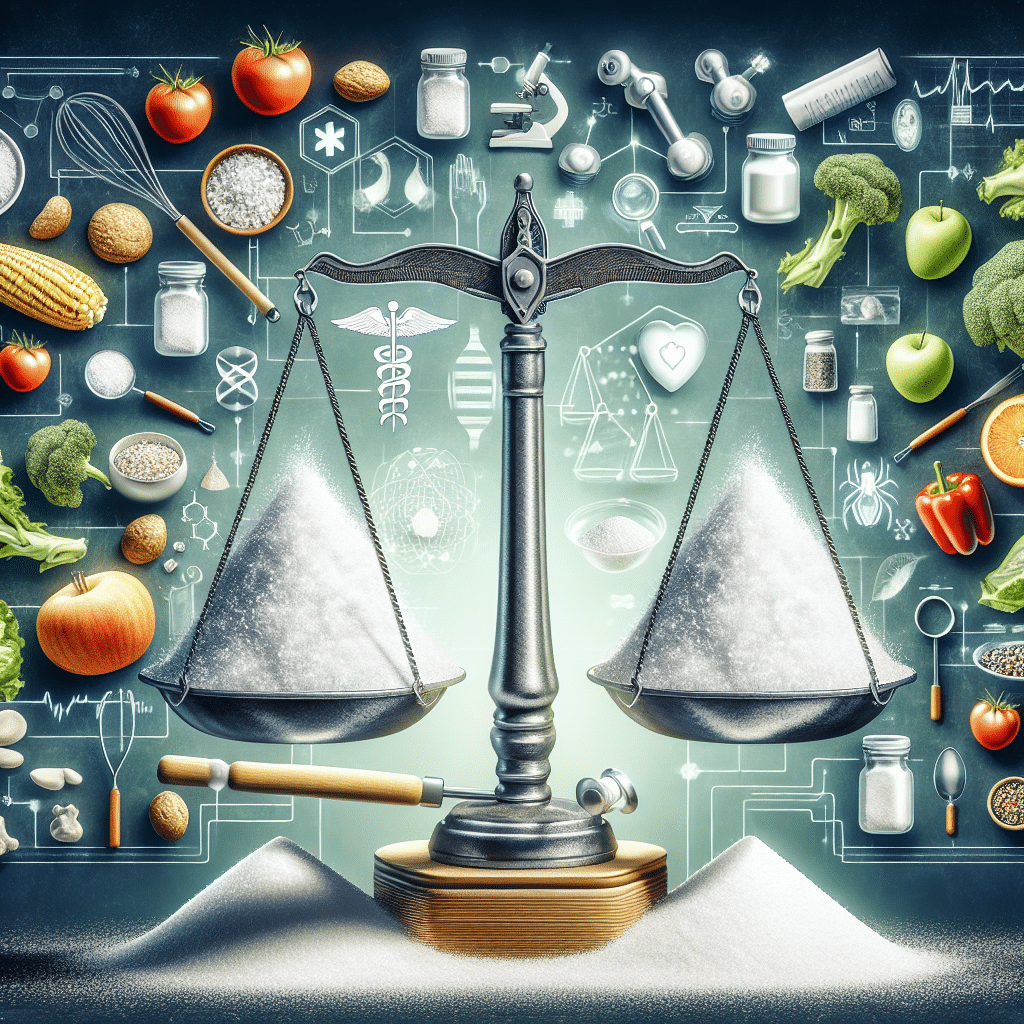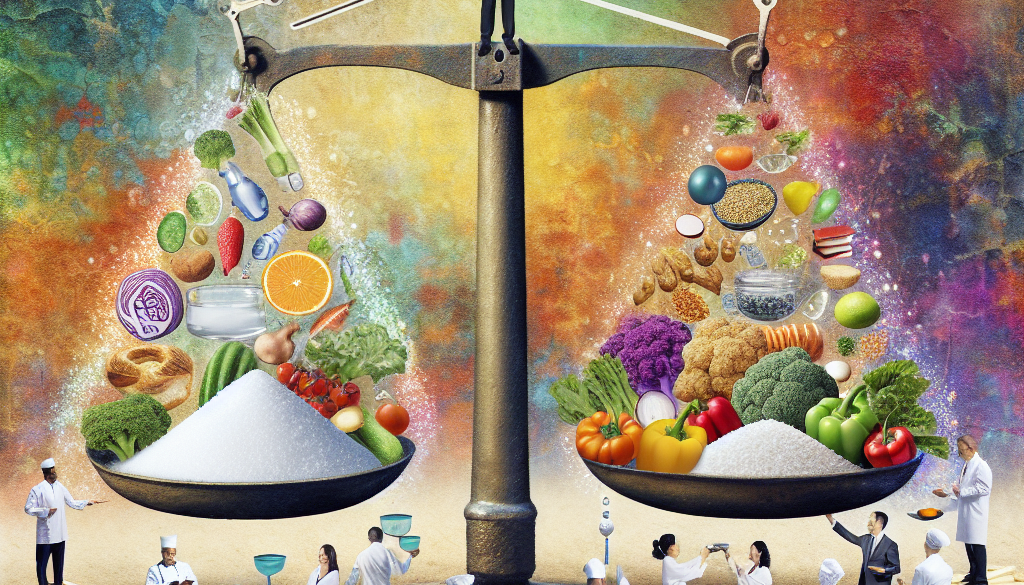The Safety of Sodium Reduction in the Food Supply: A Cross Discipline Balancing Act
-
Table of Contents
- Sodium Reduction in Food Supply: Ensuring Safety and Balance
- The Health Implications of Sodium
- The Role of Sodium in Food Safety and Quality
- Strategies for Sodium Reduction
- Case Studies and Examples of Successful Sodium Reduction
- Challenges and Considerations in Sodium Reduction
- Future Directions in Sodium Reduction Research
- Conclusion: A Collaborative Effort for Public Health
- Enhance Your Diet with ETprotein’s High-Quality Protein Products
Sodium Reduction in Food Supply: Ensuring Safety and Balance

The topic of sodium reduction in the food supply is a complex and multifaceted issue that requires a careful balancing act across various disciplines. Excessive sodium intake is a significant health concern, linked to high blood pressure, heart disease, and stroke. However, sodium also plays a crucial role in food safety, preservation, and flavor. This article explores the safety of sodium reduction in the food supply, examining the challenges and strategies involved in achieving a balance that promotes public health without compromising food quality and safety.
The Health Implications of Sodium
High sodium consumption is a global health issue. The World Health Organization (WHO) recommends a maximum intake of 2,000 mg of sodium per day, yet many people exceed this limit. Excessive sodium intake is associated with hypertension, which is a leading risk factor for heart disease and stroke. Reducing sodium in the diet is therefore a public health priority.
- Chronic diseases linked to high sodium intake
- Recommended daily limits and current consumption statistics
- Public health initiatives for sodium reduction
The Role of Sodium in Food Safety and Quality
Despite the health risks associated with high sodium intake, sodium chloride (table salt) is an essential ingredient in the food industry. It acts as a preservative, inhibiting the growth of bacteria, and contributes to the texture and flavor of foods.
- Preservation and antimicrobial properties of sodium
- Impact on food texture and consumer acceptance
- Technical challenges in reducing sodium content
Strategies for Sodium Reduction
Reducing sodium in the food supply is not a straightforward task. It requires a multi-pronged approach that involves food manufacturers, public health bodies, and consumers. Strategies include reformulation, consumer education, and regulatory measures.
- Reformulation of processed foods to lower sodium content
- Consumer education campaigns on the importance of low-sodium diets
- Regulatory approaches, such as setting maximum sodium levels in certain food categories
Case Studies and Examples of Successful Sodium Reduction
Several countries and organizations have implemented successful sodium reduction initiatives. These case studies provide valuable insights into effective strategies and the potential challenges that may arise.
- Case study of the UK’s voluntary salt reduction program
- Examples of product reformulation by major food companies
- Impact assessments of sodium reduction policies
Challenges and Considerations in Sodium Reduction
While the benefits of sodium reduction are clear, there are several challenges that must be addressed. These include technical limitations, consumer preferences, and economic implications for the food industry.
- Technical challenges in maintaining food safety and quality
- Consumer resistance to changes in taste and flavor profiles
- Economic impact on food manufacturers and the potential for unintended consequences
Future Directions in Sodium Reduction Research
Continued research is essential to develop new technologies and strategies for sodium reduction. This includes exploring alternative ingredients, improving food processing methods, and understanding consumer behavior.
- Advancements in food technology for sodium replacement
- Research on consumer acceptance of low-sodium products
- Long-term health outcome studies related to sodium reduction
Conclusion: A Collaborative Effort for Public Health
The safety of sodium reduction in the food supply is a delicate balancing act that requires collaboration across disciplines. While reducing sodium intake is crucial for public health, it must be done in a way that maintains food safety, quality, and consumer acceptance. By leveraging research, innovation, and policy, we can work towards a healthier food supply with lower sodium levels.
Enhance Your Diet with ETprotein’s High-Quality Protein Products
If you’re looking to improve your diet and reduce sodium intake, consider incorporating ETprotein’s range of high-quality protein products into your meals. ETprotein offers a variety of organic, non-GMO, allergen-free vegan proteins that can help you maintain a balanced and nutritious diet without compromising on taste or quality.
Whether you’re a food manufacturer looking to reformulate products with lower sodium content or a health-conscious consumer seeking better dietary options, ETprotein’s products provide a versatile solution. Their protein offerings, including rice, pea, and seed-based proteins, are not only nutritious but also sustainably sourced and produced.
For those interested in sampling ETprotein’s products or learning more about their benefits, please reach out to the company at sales(at)ETprotein.com.
About ETprotein:
ETprotein, a reputable protein and L-(+)-Ergothioneine (EGT) Chinese factory manufacturer and supplier, is renowned for producing, stocking, exporting, and delivering the highest quality organic bulk vegan proteins and L-(+)-Ergothioneine. They include Organic rice protein, clear rice protein, pea protein, clear pea protein, watermelon seed protein, pumpkin seed protein, sunflower seed protein, mung bean protein, peanut protein, and L-(+)-Ergothioneine EGT Pharmaceutical grade, L-(+)-Ergothioneine EGT food grade, L-(+)-Ergothioneine EGT cosmetic grade, L-(+)-Ergothioneine EGT reference grade and L-(+)-Ergothioneine EGT standard. Their offerings, characterized by a neutral taste, non-GMO, allergen-free attributes, with L-(+)-Ergothioneine purity over 98%, 99%, cater to a diverse range of industries. They serve nutraceutical, pharmaceutical, cosmeceutical, veterinary, as well as food and beverage finished product distributors, traders, and manufacturers across Europe, USA, Canada, Australia, Thailand, Japan, Korea, Brazil, and Chile, among others.
ETprotein specialization includes exporting and delivering tailor-made protein powder and finished nutritional supplements. Their extensive product range covers sectors like Food and Beverage, Sports Nutrition, Weight Management, Dietary Supplements, Health and Wellness Products, and Infant Formula, ensuring comprehensive solutions to meet all your protein needs.
As a trusted company by leading global food and beverage brands and Fortune 500 companies, ETprotein reinforces China’s reputation in the global arena. For more information or to sample their products, please contact them and email sales(at)ETprotein.com today.














